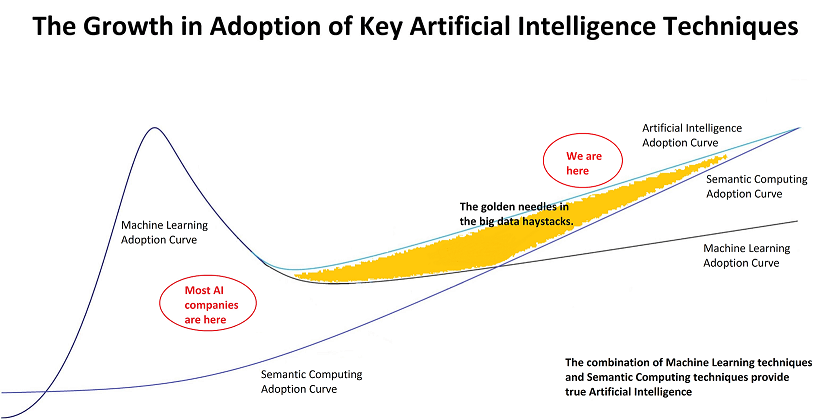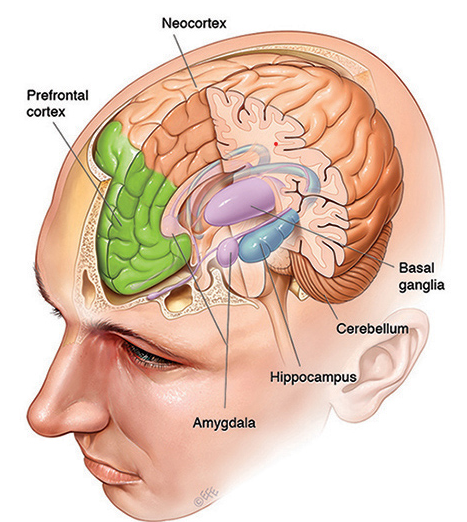What is Artificial Intelligence, AI ?
Since 2012, our Company has had a busy team of software engineers who are expert in both research and development of Artificial Intelligence, “AI”. Our researchers are led by a former IBM Gold Consultant.
Since 2013 a requirement of our researchers is that they have a PhD in a field related to AI. Our developers are highly competent senior developers. We are often asked “what exactly is AI?”.
Most experts have settled on a description of AI as being the scientific endeavour of building computers that mimic the capabilities of the human brain. No one who fundamentally understands AI is seriously arguing that we can build a computer that can match the intelligence of the human brain in the foreseeable future, if ever. Indeed, we still don’t know how the human brain works.
We all know that computers can do some things we humans can’t. Computers have beaten world champions of popular games including Chess, Jeopardy and Go. They can identify a person using facial recognition in fractions of a second.
But the gaming successes are examples of clever techniques rather than intelligent computers. To achieve them, computers need a clever human-made mathematical formula called an algorithm and, often, lots of training managed by humans.
Computers can compare millions of images at phenomenal speed to seek a match based on the pattern of the pixels in the image, but they probably won’t know that what they are identifying is a human being or, indeed, what a human being is.
The ability to do these clever things is through the use of computer techniques broadly known as Machine Learning. So, what is that?
Machine Learning is a technique that is associated with AI, but is not AI. It has been very useful in helping human endeavours in image and sound processing, language translation and trend analysis.
It is clever, but it is not AI.
" A field of study that gives computers the ability to learn without being explicity programmed." - Arthur Samuel - Machine Learning Pioneer. Source.
It’s important to understand that AI is not a single technique or technology.
We are at the beginning of a new era of AI, one that follows a sixty-year history of patchy achievement and predominant failure of many techniques and technologies.
General understanding of what exactly AI is changes every year or so. Three years ago, it was common to hear most “experts” use the term AI interchangeably with Machine Learning, yet the difference has been well understood by real experts for thirty years or more.
As we advance in this AI endeavour, we will learn that true AI will result from the use of many complimentary techniques and technologies, not one or two.
This new phase in the history of AI, facilitated largely by recent substantial progress in delivery of very high computing capacity in Cloud Computing, is expected to finally break through previous technology bottlenecks. Techniques and technologies that have been well understood for two or three decades can now be usefully applied to intelligently assist human endeavour in everything from autonomous vehicles to medical research.
Companies like PwC, McKinsey, GE, Deloitte and many others forecast economic benefits from adoption of AI to add the equivalent of the US economy to global GDP by 2030, an additional US$15 trillion. So convinced are they of the arrival of this breakthrough in AI that they often refer to it in terms such as “the 4th Industrial Revolution”, comparable to the previous three centred on Steam, Electricity and Digital Computers.
We are confident that this new revolution in computing is real, but that we are at the very beginning of it, and we still have a lot to learn.
We can be confident of that because even the well-known technology companies are making headline-grabbing missteps with AI.
These include:
➢ IBM’s “Watson for Oncology” Cancelled After $62 million and Unsafe Treatment Recommendations”
➢ Microsoft’s AI Chatbot Corrupted by Twitter Trolls
➢ Apple’s Face ID Defeated by a 3D Mask
➢ Amazon Axes their AI for Recruitment Because Their Engineers Trained It to be Misogynistic
➢ Amazon’s Facial Recognition Software Matches 28 U.S. Congresspeople with Criminal Mugshots
In 2019 we have advised three large enterprises where each had trialled a signature AI platform from a global technology vendor and the project had failed. In two of these tens of millions of dollars were involved.
Their reactions? After a brief fall-out and trial separation, one has forgiven and cautiously re-engaged with the vendor. The second is trying again as an in-house project. The third is yet to engage in another AI project despite having a very important project that is ideally suited to AI with substantial savings and quality improvement opportunities.
There is no doubt that AI is an existential threat to industries that don’t adapt to new business models powered by new technologies.
According to the Australian Financial Review on December 27, Australia’s comparatively wealthy Banks are vulnerable - “by 2030 Millennials will comprise 75% of the workforce.
Their expectation of digital service will be set by companies such as Facebook, Amazon, Paypal, Apple or Google, which are all starting to play in financial services, along with masses of specialist fintech start-ups.
But it doesn’t have to be that way.
The Australian taxi industry, for example, has been a global technology leader for thirty years and reacted well to the onslaught of Uber. While they are yet to match the perceived convenience and cost of Uber, they have rolled out similar enabling technology quite quickly.
So, what is AI and what is it not?
AI is a huge opportunity and a huge threat to nearly every enterprise, but AI is not a quick solution, a black box that you can buy and switch on for instant success.
AI is not a technology; it is a collection of technologies brought into play as needed.
Of the two major disciplines in AI it is Knowledge Engineering, not Machine Learning, that is the most important for true computer intelligence.
Clearly, there’s a greater benefit in Learning if the computer can store the new knowledge somewhere for knowledge accumulation and later use (sounds a bit like human intelligence, eh?).
Both fields have been around for decades and it is their combined and complimentary use that will herald the great advances that are coming. In 2019 we have seen the realisation amongst leading experts that a computer cannot have intelligence without it having a Store of knowledge that is understands itself, without human programming.
After thirty frustrating years, Knowledge Engineering is now in its ascendancy. In 2019 we have also acknowledged the great successes of Machine Learning techniques in areas like pattern recognition, but now seen that in the context of its early hype.
“Common sense, people. Neural networks (in Machine Learning) are not simulating much more than a Slug’s level of intelligence. What are the odds you taught a slug to understand English?”
We’ll explain more about Knowledge Engineering and how it gives computers an intelligent understanding of things in our next Chapter.
As you do for all software technology adoption, beware the great lock-in .
Use technologies that adhere to international standards ratified by bodies such as W3C. Design and build components that are reusable and able to be integrated across multiple AI applications spanning the enterprise.
AI adoption is a journey, not a quick fix. Pick a project where the benefits are compelling.
Its success is driven by the leadership of a committed executive team, and deployed by internal experts. External expert AI consultants are important in the early stages, but for early guidance and skills transfer only. AI is about improving your business. External consultants are rarely experts on running your business; you and your people are.
You should be at least 30% self-sufficiency in the first year and 90% self-sufficiency in the second year.
Like all software development don’t ever forget that you own it, you can’t outsource failure.
Finally, there is the usual hype and voodoo the software industry is so expert at. AI is not daunting and can be very successful if you own it, drive it, and get your best people engaged.
Find external expert advisors that don’t have an objective of large, multi-year, expensive projects driven by them. If you can do these things, you will likely transform your business into something much more effective, with happier customers, and more engaged staff that can escape the mundane tasks to add higher value to the team effort.






